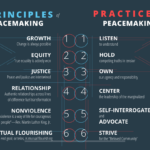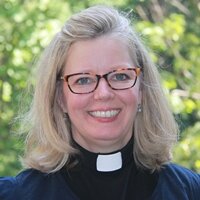Persevering in the Practice of Peacemaking
By Telos alumna Rev. Mary Amendolia Gardner.
Psalm 34:14 Turn away from evil and do good; seek peace and pursue it. (ESV)
Advent marks the beginning of the new church year, a helpful time to take stock of where we have done well and to reflect on areas where we hope to grow and change. In my role as a spiritual director, during Advent I ask my directees to reflect on the year just ended and to look with hope towards the year ahead.
After completing this reflection, I then ask directees what would they like to pursue in the new year, what spiritual disciplines or practices they can use to further their own growth. My hope is to continue to grow as a peacemaker. Whether peacemaking is new to you or whether you have pursued a vocation as a peacemaker, this season offers an opportunity to reflect practically and tangibly on ways in which you may become more deeply a person of peace.
How does one seek peace, and what does it mean to pursue it?
The most important place to start is with prayer. Ask God to guide you as you consider where and with whom to engage peacemaking efforts . Next, consider Telos’ helpful infographic, the Principles and Practices of Peacemaking, which sets out some key principles and practices of peacemaking; it has challenged and inspired my efforts as a peacemaker. Perhaps use it as a starting place to review how you did as a peacemaker this past year. An honest self-assessment is a good start.
. Next, consider Telos’ helpful infographic, the Principles and Practices of Peacemaking, which sets out some key principles and practices of peacemaking; it has challenged and inspired my efforts as a peacemaker. Perhaps use it as a starting place to review how you did as a peacemaker this past year. An honest self-assessment is a good start.
The first practice of peacemaking is to listen to understand. Perhaps, for example, reflect on where you listened well to others in this past election cycle. Or to put it another way, where you failed to listen to others in this past election cycle. Then go deeper to ask: Why was I willing to listen – or not? Your answers may help you think about how better to practice peacemaking in the year ahead. I know I have room to grow here.
One of the many things I learned on my Telos trip in March 2018 is that to be a peacemaker is costly. It requires commitment and intention. It may even cost you your reputation, given how others may perceive you, your intentions, and motives. But Scripture highlights the need of peacemaking, despite the cost.
In the Bible, the word “peace” is mentioned over 400 times; the Hebrew word “shalom” is a key concept in scripture. Shalom is not only the absence of hostility but even more the presence of human flourishing and wellbeing. A Biblical understanding of peace thus contains many strands of ideas. God makes a covenant of peace with his people. Peace is also a characteristic of God, which is why it is so important to practice peacemaking.
Advent is that wonderful season of both the “not yet” and the “now,” of both anticipation and waiting and the certain knowledge that Jesus the Messiah has come. We are reminded in the Christmas story that the tidings of “Peace on Earth” the angels declared to the shepherds come only with the announcement of Jesus’ birth. But in the spirit of Advent, we can nevertheless practice peace on Earth as an important part of preparing our hearts for the coming of the Prince of Peace.
The original lyrics of the much beloved Christmas tune O Holy Night by Placide Cappeau de Roquemaure (1847) contained these words: “Truly He taught us to love on another, His law is love and his gospel is peace….And in His name all oppression will cease.” As we seek to be peacemakers, may our prayer for the year ahead be that we act with love towards others whom we may perceive as our enemies and for all oppression to cease. Amen.

Rev. Mary Amendolia Gardner is a priest in the Anglican Church in North America and a Spiritual Director with Coracle. She is currently pursuing a DMin. at Wesley Theological Seminary in Curating Community Through the Arts. She and her husband John are both Telos alumni.
